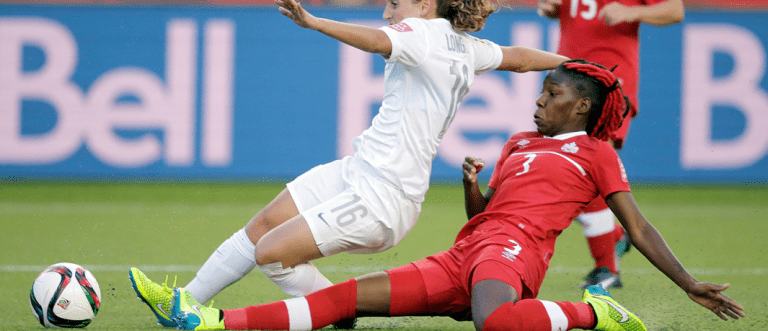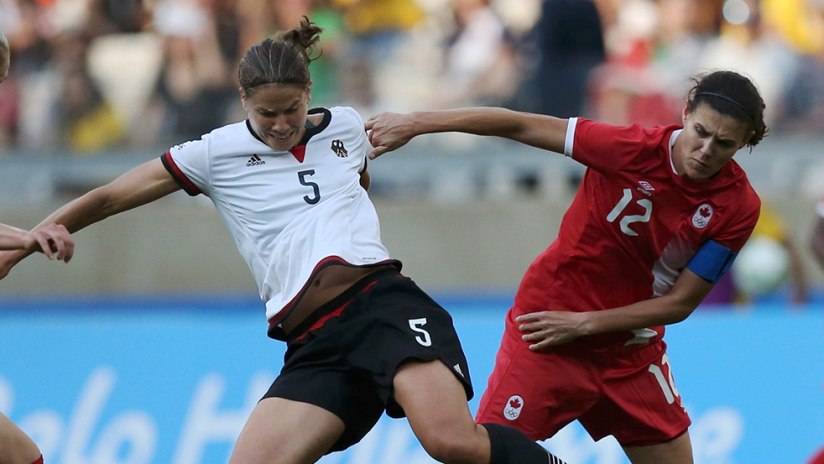The Olympic tournament isn’t yet over for Canada, even if their fever dream of a fairytale ending is.
The Canadian women’s national team lost to Germany in the Olympic semifinals on Tuesday, in what – based on every available ounce of history regarding these two teams prior to Rio – would customarily have been an entirely unsurprising and unremarkable result. (WATCH HIGHLIGHTS HERE)
But this was no regular tournament for Canada, and there will never again be anything “unremarkable” about reaching the Olympic semifinal.
For starters, Canada posted their first-ever win over Germany a week ago in the group stage. First win, ever. Sure, both teams rested key starters and rarely pushed things out of second gear in that match. In other words, that was not full-strength Germany losing to full-strength Canada.
Even so, that unprecedented result gave Canada a perfect three-win record in the group stage, and had many observers – including yours truly – wondering whether this Canadian team could thread the needle and win a major international tournament for the first time (sorry, Cyprus and Algarve Cups).

On Tuesday, however, we did get full-strength Germany and full-strength Canada. And all of a sudden, this started feeling a lot like that eminently memorable Olympic semifinal against the United States from London 2012.
That game, of course, had everything: wild back-and-forth action, scrappy Canada giving it their all against a superior opponent, an all-time great individual performance from Christine Sinclair (who scored a hat trick), and a pair of controversial, game-deciding refereeing decisions.
It had every element necessary to become a Canadian classic: an identifiable hero (Sinclair), a number of identifiable villains (Abby Wambach and Norwegian referee Christina Pedersen) and the oddly edifying sensation of settling for moral victory after having had actual victory ostensibly ripped away by our great rivals to the south.
This year’s semifinal contained no such elements. The referee was fully competent, controlling the game from start to finish; if anything, North Korean official Ri Hyang Ok may have actually been lenient on a Canadian team that seemed intent on clobbering the Germans into submission.
There were no German strikers incessantly counting to six in the referee’s ear, no German goalkeeper distracting from their own top-quality skills with on- or off-field antics. There was simply a perennially strong team doing something Canada couldn’t do on the day – making the most of their opportunities.
That first opportunity for Germany came after a needlessly conceded penalty kick early in the first half. Kadeisha Buchanan, who’s always played a high-risk, high-reward style, slid in on Alexandra Popp and received her fourth (yes, fourth) yellow card of the competition in the process.

It’s hardly been an ideal tournament for Buchanan, whose physicality is usually one of her strong suits. Still, one is inclined to give the long-term benefit of the doubt a 20-year-old who’s already become a core national-team player despite having zero professional games under her belt.
On the other end of the field, Janine Beckie – likely the most clinical finisher on the Canadian roster, aside from Sinclair – spurned two golden opportunities, one on either side of halftime. Neither were “gimme” goals by any stretch, but as the team readily admitted ahead of the game, chances of any sort against Germany were going to be few and far between.
The disappointment will linger for those two, and the remainder of the team. Yet the hope is that ultimately such experiences will build resolve for a pair of players projected to remain linchpins of this team for many, many years.
While the 2012 Olympics launched grand narratives about soccer finally breaking through in Canada, and the government building its own version of Mount Rushmore specifically to put Sinclair’s face on it, the takeaways from this competition will be relatively low-key, regardless of the result of Friday’s bronze-medal game against Brazil.

There have been plenty of lessons to learn in Rio, and plenty of youngsters at the heart of the team who will have the capacity to carry them forward.
Naturally, winning a second straight Olympic bronze medal is nothing to sneeze at, particularly for a nation that’s hardly been collapsing under the weight of its historical achievements in soccer (with all due respect to Galt FC).
In fact, looking at the bronze-medal game as a letdown is probably the clearest sign of the higher expectations to which the Canadian program has begun to hold itself.
But even after the year-over-year hype generated by the bronze in London, the sold-out stadiums at last summer’s Women’s World Cup and this year’s group-stage win over Germany, it’s hardly the sort of prize that Canadian players and fans would have allowed themselves to believe was attainable.














